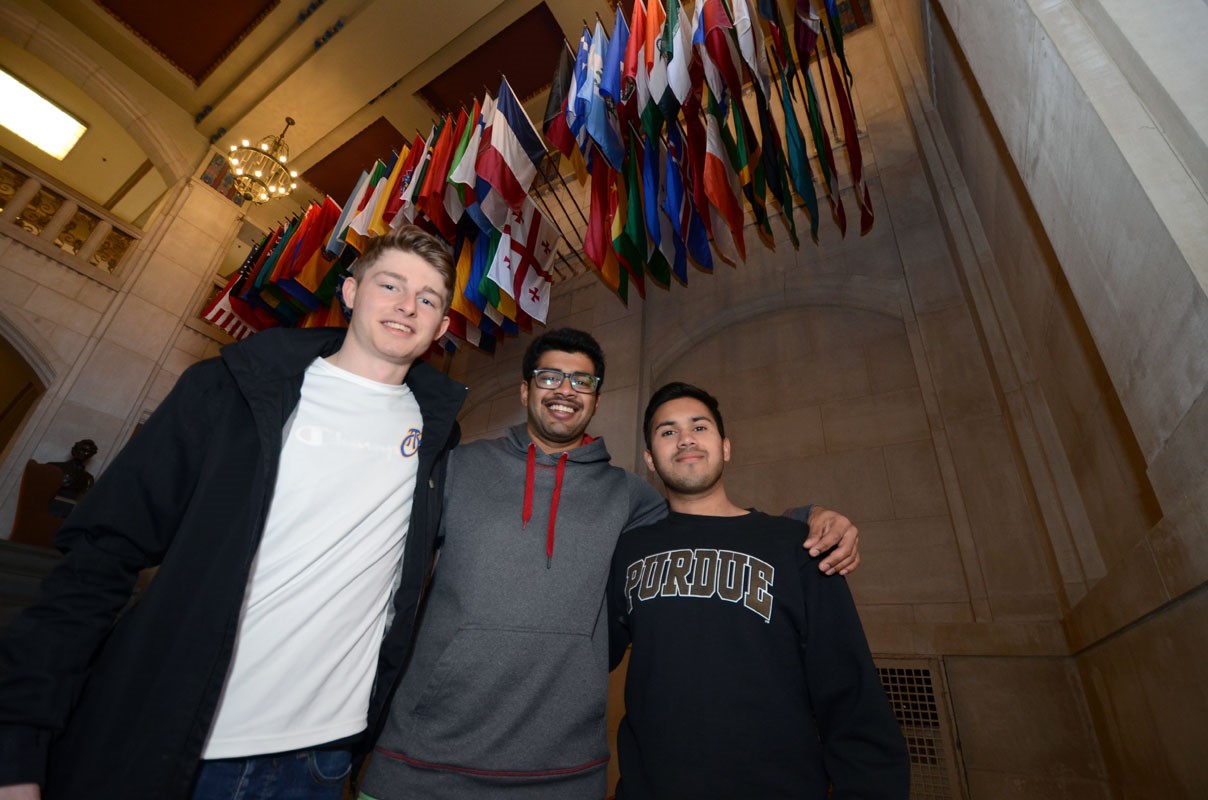While many international students mix with others from similar cultures, others integrate themselves – albeit cautiously – with a limited number of American friends. In the past, the Omega (Purdue) chapter has had its share of students from other countries, including Greece and Switzerland over the years. The current group of Pi Kapp undergraduates has members from four different continents among its ranks. Of the 150+ chapter members, five are from other countries. And, to a man, they have been surprised at how easy it was to integrate into an entirely different cultural experience.
“It may seem ‘cringy’ (a British term meaning describing something cringe-worthy) telling people that I am part of a brotherhood” (as Greek traditions are almost non-existent in the UK), said Jacob Keeling, “but the closest I can relate it to is a sports team that lives, studies, socializes and volunteers together.”
Keeling is an exchange student from a small town in England majoring in geology. He will be on the Purdue campus for only one academic year. He’s the second British exchange student in the chapter in the last three years. “The Pi Kappa Phi experience has given me the opportunity to participate in many philanthropic/volunteer events that I never anticipated I’d be doing as part of a fraternity, especially in such a short amount of time,” Keeling said.
Halfway through his second semester on campus, he has participated in the Purdue University Dance Marathon, a campus winterization project, the chapter’s David Feltner Memorial Bike a Thon and Arctoberfest.

“I think that I have made lifelong friendships being part of this brotherhood, something that I would not have thought possible upon my arrival in America,” he said. His British predecessor to the chapter, Reece Kenney, rushed Pi Kappa Phi out of boredom in fall 2013.
“Well I didn’t even know what a fraternity was before I got here really,” he said. “I had heard about ‘frats’ on TV and in movies but it kind of went over my head since they don’t exist in the UK. I certainly didn’t know what rushing was at the time and the only reason I joined a fraternity was because I had a roommate who was really into the whole Greek life thing and he explained it all to me.”
In the end, though, it was a decision he’s thrilled about. “Little did I know, joining a Fraternity was the best decision I made during my time abroad,” he said. “That decision still impacts my life now and is the reason I’m where I am today.” He’s now a software engineering position with Microsoft in Prague of the Czech Republic. He majored in computer science in his two years of college in the UK interrupted by his one year overseas. It was a pledge brother, Sam Sharkey, who referred him to Microsoft.

Two chapter members are from India – Mahir Prasad and Pranit Das. Prasad is a biochemistry major and is Das an industrial engineering major. Prasad waited until his sophomore year to join a fraternity. Some of his other countrymen attended colleges in the southern United States, and they encouraged him to try fraternity life. “Having lived in two different countries, I had mixed reviews about the Greek system, so I wanted to check it out for myself,” he said. “I came here and loved it because the guys in the chapter are genuine and care about you. They wanted to know what you do and what you could bring to the chapter and improve upon it.” As his hesitations subsided, he knew persuading his parents was another thing altogether. Both his parents attended graduate school in the U.S., but “they had a skewed opinion” of Greek life.
”Obviously, my parents are Indian and they watched movies,” he said. “Just being able to convince them was the challenge. I told them about Journey of Hope, the Pi Kapp 100 and what we do in service. That eased them a little bit.”
His mother attended the 2016 Moms Day events at the fraternity. “When my mom came to Moms Day and she was like, ‘Well, I believe you, I really like it and I want to come back again.’

The final member of the chapter is David Osma, an electrical engineering major from Bogota, Columbia. Of the 2,990 men in Interfraternity Council’s membership, 3.3 percent identify themselves as international, according to Purdue statistics. However, that number includes members in fraternities that identify themselves as multicultural, too. “It is very common for international students to seek experiences that are very ‘American, ” said Brandon Cutler, Purdue associate dean of students of fraternity, sorority and cooperative life. “That includes cars, clothes, pastime, etc. Thus, we are seeing more students from international backgrounds that are joining fraternities and sororities.”